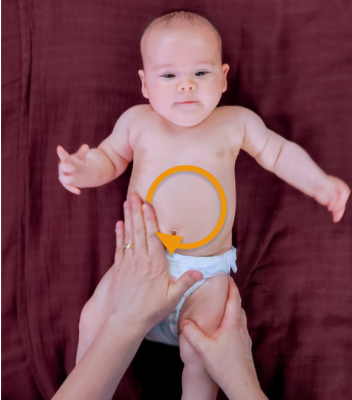
Primitive Reflexes and Child Development
Blessingways Family Wellness – Airdrie, Alberta

What Are Primitive Reflexes
Primitive reflexes are the automatic movements Baby is born with that help them eat, move, and stay safe. These early reflexes include the Rooting, Palmar Grasp, Startle (Moro), and Suck Reflexes. They are controlled by Baby’s brainstem and are essential for feeding, breathing, and responding to new sensations.
As Baby grows and gains more control over their body, the brain begins to replace these automatic responses with voluntary movements. When this process occurs, the reflexes are said to integrate. Reflex integration allows Baby’s nervous system to develop new pathways for balance, coordination, and learning.
How Primitive Reflexes Naturally Integrate
Primitive reflexes integrate through repetition and movement. Each time Baby turns their head, lifts their body during tummy time, reaches for a toy, or begins to crawl, their brain receives new sensory feedback. This process teaches the nervous system that it no longer needs to react automatically to certain stimuli.
When primitive reflexes integrate, Baby is free to move with more intention and control. Common milestones that support natural reflex integration include:
Tummy time to build head and neck control
Rolling and crawling to improve body coordination
Grasping and releasing toys to develop hand strength and control
Rhythmic movement and play to promote sensory awareness and brain-body connection
If you’d like to explore simple ways to support Baby’s brain and body development, visit our Best Beginnings Infant Massage and Movement Program to learn how touch and play encourage natural reflex integration.
Retained Primitive Reflexes affect EVERYTHING
〰️
Retained Primitive Reflexes affect EVERYTHING 〰️
When Primitive Reflexes Do Not Integrate
If a reflex remains active beyond the first year, it is known as a retained reflex. Retained primitive reflexes can affect how Baby’s brain organizes movement, focus, and learning. Because the nervous system is still responding automatically, children may struggle to sit still, read comfortably, or coordinate fine-motor tasks.
Some common signs that primitive reflexes may still be active include:
Learning and Attention
Difficulty sitting still or concentrating
Learning challenges with reading or math
Right/left confusion or mixing up b’s and d’s
Decreased concentration or attention span
Movement and Coordination
Tight pencil grip or poor handwriting
Clumsiness or frequent tripping
Toe walking or awkward gait patterns
Poor posture or muscle tone
Motion sickness or fear of movement
Sensory and Emotional Signs
Sensitivity to touch or certain textures
Bed wetting beyond age five
Anxiety, nervousness, or mood swings
Trouble calming down or controlling impulses
Other Common Signs
Thumb sucking beyond 1½ years old
Eating with hands instead of utensils
Frequent ear infections or IBS over age four
Headaches or fatigue
Avoids walking on grass or uneven surfaces
These patterns do not mean that anything is wrong with your child — or with you. Both children and adults can have retained primitive reflexes if the nervous system did not fully integrate them during early development or if stress or injury reactivates them later in life.
These signs can indicate that the brain and body may need extra support to complete important movement and coordination pathways.
Gentle chiropractic care, along with consistent home movement activities, can help encourage natural reflex integration and support smoother, more efficient brain-body communication at any age.
How Chiropractic Care Can Help
At Blessingways Family Wellness in Airdrie and North Calgary, our chiropractors—Dr. Melanie Beingessner, Dr. Laurence Dion, and Dr. Leah Robinson—help families support healthy brain and body development through gentle, movement-based chiropractic care.
When retained primitive reflexes are suspected, we:
Perform a thorough chiropractic and neurological examination.
Review a detailed intake form to identify which reflexes may be active.
Create a personalized care plan that includes gentle chiropractic adjustments and home-based movement activities.
Recommend daily exercises to help the nervous system learn new, more coordinated patterns.
Re-evaluate progress regularly to monitor changes and refine care.
Every nervous system is unique. While many people respond well to chiropractic adjustments and home movement activities, progress depends on each individual’s ability to adapt and integrate new information.
📞 Call Blessingways Family Wellness at (403) 945-2422
to book your appointment or learn more about our family chiropractic services in Airdrie
Best Beginnings: Infant Massage and Movement Program
Ready to nurture your baby’s growth from the very beginning?
Our Best Beginnings Program teaches parents hands-on ways to support healthy growth and brain development, calm Baby’s nervous system, and encourage reflex integration through touch and play.
You’ll receive:
● Over 20 hours of guided video tutorials
●Simple, science-based activities you can do at home
● Practical home organization tips
● Exclusive downloadable guides and printable resources
● Unlimited lifetime access
Dr. Melanie, Dr. Laurence and Dr. Leah have taken many courses about retained primitive reflexes. One course, offered by Harkla, called Assessment and Integration of Primitive Reflexes Master Level was created by Rachel Harrington and Jessica Hill, both occupational therapists
We have been given permission by them to post their very thorough information on our website and to give their handouts to our patients.







